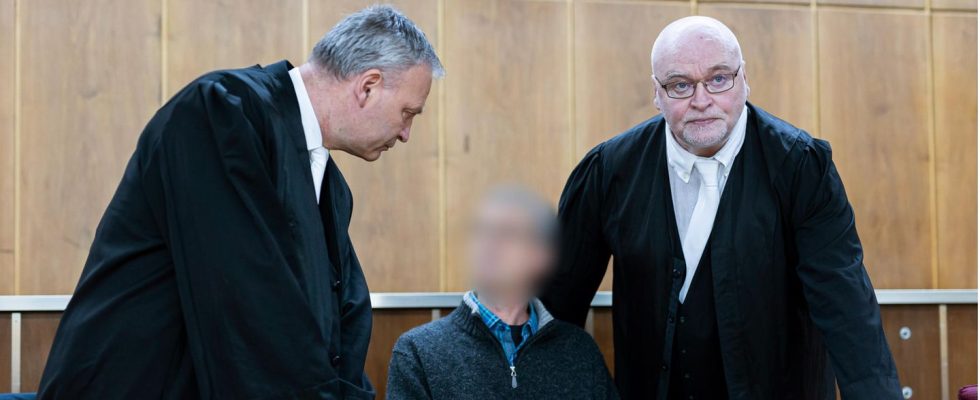Attempted murder
The violinist with the rat poison – orchestra musician sentenced to six and a half years in prison
The former violinist (M.) of the Schleswig-Holstein Symphony Orchestra poisoned three people, according to the Hanover regional court. Defense attorney Matthias Waldraff (r.) announced that he wanted to appeal
© Michael Matthey/ / Picture Alliance
It’s a case like a crime thriller: an orchestra musician has murderous thoughts, gets rat poison and tries to poison three people. Among them is his mother. The allegations are unimaginable for the violinist – and so is the verdict.
The 62-year-old stares ahead as if petrified, obviously he can hardly believe it: the violinist of the Schleswig-Holstein Symphony Orchestra has to go to prison for six and a half years – for attempted poisoning and other dangerous crimes Mayhem. “The tenor will have surprised some,” said the presiding judge at the Hanover Regional Court, Martin Grote, on Monday. Defense attorney Matthias Waldraff immediately announced his intention to appeal.
“Without a doubt, the threads come together with you,” Grote said to the 62-year-old in his reasons for the verdict. “You are the link in these cases.” According to the court’s conviction, the convicted German mixed rat poison into the food of his 93-year-old mother in a retirement home in Hanover in September 2022.
Rat poison in garlic dip
And a few days later he gave two colleagues on a concert tour a garlic dip containing the poison. The victims suffered blood clotting disorders that could have killed them. The man’s mother received several blood units.
The public prosecutor’s office had demanded twelve years in prison for the crimes, as well as subsequent preventive detention. The man’s lawyers, however, called for an acquittal.
But why did the convicted man commit the acts he was accused of? “It’s not that you didn’t have a motive – we just don’t know what it was,” Grote continued in the verdict. A number of motives are conceivable – and the facts make it possible to safely conclude that the 62-year-old was the perpetrator.
The violinist’s motives remain unclear
The court had no doubt that the man had a close relationship with his mother. However, their health deteriorated rapidly and dementia was also diagnosed. It is assumed that he tried to kill the old woman out of despair over her dementia.
In the case of the poisoning of colleagues from the orchestra, the court assumed that there was dangerous bodily harm rather than an intention to kill – it was probably a reminder about the lack of support in a “life crisis that you perceived as existential,” said Grote. The 62-year-old felt attacked and bullied by another musician in the orchestra – as a result, his depression increased and he had suicidal thoughts.
He also admitted that he had ordered the poison Brodifacoum to harm this colleague. But he gave up the plan and disposed of the poison. Judge Grote now said the court did not believe he actually threw away the poison.
Symphony orchestra fired violinist
Legally, he assumes attempted murder combined with dangerous bodily harm in the case of the mother, said the judge. The individual sentence was five years and nine months. In the case of the poisoned colleagues, the court assumed dangerous bodily harm – that meant an individual sentence of three years. This results in a total sentence of six years and six months.
In his closing statement, the 62-year-old emphasized that it was unimaginable for him to harm his mother or his old friends. In September it became known that the Schleswig-Holstein State Theater and Symphony Orchestra had fired him.
Defense attorney sees “no intent to kill”
Lawyer Matthias Waldraff explained that the court was working with constructs and was walking on thin ice with its verdict – now the Federal Court of Justice has to determine “whether it holds up”.
He doesn’t see any intent to kill on his client’s part. He had already described the musician as a sophisticated spirit whose life was shaped by music and notes. The defense attorney emphasized that it was reassuring that the court had stayed under the prosecutor’s request for five and a half years, and preventive detention had not played a role.

